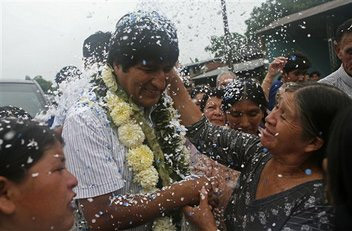
|  |  |  Americas & Beyond | December 2009 Americas & Beyond | December 2009  
Bolivian President Morales Easily Wins Re-Election
 Frank Bajak - Associated Press Frank Bajak - Associated Press
go to original
December 07, 2009


| | A coca farmer welcomes Bolivia's President Evo Morales, left, as he arrives to a polling station to vote in general elections in Villa 14 de Septiembre village in central Bolivia, Sunday, Dec. 6, 2009. (AP/Juan Karita) |  |
La Paz, Bolivia — President Evo Morales easily won re-election, according to unofficial results, getting an overwhelming mandate for further revolutionary change on behalf of Bolivia's long-suppressed indigenous majority.

Morales' allies also won a convincing majority in both houses of Congress in Sunday's election.

Opponents say they fear the coca-growers' union leader union will use his consolidated power not just to continue reversing racially based inequalities but also to trample human rights and deepen state influence over the economy.

Unofficial counts of 98 percent of the vote by two polling firms said Bolivia's first indigenous president won with 63 percent of the ballots - 36 points ahead of his closest challenger in a field of nine candidates.

Jubilant supporters waving Bolivian flags jumped up and down in La Paz's central Murillo square after polls closed, chanting "Evo! Evo!"

Manfred Reyes, a center-right former state governor and military officer, conceded soon after. He won 27 percent of the vote, according to the unofficial tallies.

In a booming victory speech punctuated by fireworks from the balcony of the presidential palace, Morales called on all sectors of society - including the opposition - to unite behind him.

"We have the enormous responsibility to deepen and accelerate this process of change," he said, insisting final results will give him two-thirds of both chambers of Congress.

The lopsided results signaled an opposition in disarray.

"Evo Morales has a mandate unlike any other president in the hemisphere, including Barack Obama," said analyst Jim Shultz of the nonprofit Democracy Center in Cochabamba. "This is the fifth national election in four years and his margin of victory has only increased each and every time."

Even in the opposition bastion of Santa Cruz state, Reyes led with only 50 percent, compared to 43 percent for Morales.

The three political parties that dominated Bolivian politics for decades have now been all but erased. The last survivor was the National Union. Its presidential candidate, Samuel Doria Medina, a centrist cement magnate, got just 6 percent of the vote, according to the quick counts.

Voters also chose a new Congress, and the quick count said Morales' stridently leftist Movement Toward Socialism easily won a majority in both the 36-seat Senate and 130-member lower house.

The movement appeared to secure two-thirds in the Senate but fall just short in the lower house.

It would need two-thirds control of both chambers to dictate terms of a law on indigenous territorial self-rule, make key appointments unchallenged and amend the constitution to allow Morales to seek a third straight term - the 50-year-old incumbent has been evasive on the latter issue.

Still, with majorities in both houses, Morales will have the power to expand on radical changes he already has made, such as indigenous autonomy and land reform.

Nearly six of 10 Bolivians live in poverty and Morales has gained immense support using increased profits from Bolivia's natural gas industry to fund highly popular subsidies for schoolchildren and the elderly as well as one-time payments for new mothers.

"We'll always back Evo Morales' government because he takes into account the poor," said Ramiro Cano, a 40-year-old jeweler and a member of Bolivia's dominant Aymara ethnic group who voted for re-election. Cano praised Morales especially for the annual subsidy his two children receive for attending school. "He's been a great help not just for me but for all families in need."

Higher prices for the natural gas and minerals that account for the bulk of Bolivia's exports have helped sustain economic growth.

Morales' victory extends the stability he has brought to a country notorious for coups and that had five presidents in the five years preceding his December 2005 election with 54 percent of the vote.

The re-election to a new five-year term comes under a new constitution ratified by voters in January that "refounded" Bolivia as a "plurinational" state, allowing self-rule for the poor South American country's 36 native peoples.

Twelve of Bolivia's more than 330 municipalities voted Sunday on indigenous autonomy, which would allow them to abandon modern political structures in favor of traditional Indian governance based on consensus-building.

Still to be defined by the new Congress are larger territorial autonomies for indigenous groups that could redraw the political map and redefine how government funds are disbursed.

Morales, the son of a llama herder, has championed all of Bolivia's Indians - at the expense of wealthy ranchers and farmers centered in pro-capitalist Santa Cruz. He has been careful, however, not to alienate too many landholders. Confiscations of fallow land have been modest.

Morales detractors say he is leading Bolivia down the same totalitarian socialist path as Venezuelan President Hugo Chavez, while similarly forging dangerous alliances with Iran and Russia.

"He's created a tyranny," said Mario Orellana, a 65-year-old retired army colonel who voted for Reyes. "He does what he likes. There's no democracy."

Besides tightening state control over the gas, oil and mining sectors, Morales has nationalized the main phone company and signaled his intention to take over the electrical power industry.

But many analysts believe Morales will be careful not to alienate the foreign investors he needs to increase raw materials output. Last month, Bolivia received a pledge of a $1.5 billion investment from the Spanish-Argentine company Repsol for natural gas development.

Relations with the U.S., meanwhile, have been rocky.

Morales expelled the U.S. ambassador and the Drug Enforcement Administration in late 2008 for allegedly inciting his political opposition.

Associated Press Writers Paola Flores and Carlos Valdez contributed to this report.
|

 |
|  |



